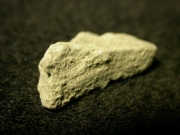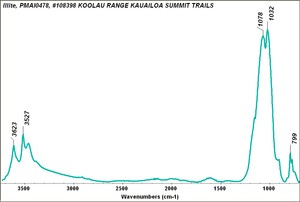Difference between revisions of "Illite"
Jump to navigation
Jump to search
| Line 9: | Line 9: | ||
==Physical and Chemical Properties== | ==Physical and Chemical Properties== | ||
| − | |||
| − | |||
| − | |||
| − | |||
| − | |||
| − | |||
| − | |||
| − | |||
| − | |||
| − | |||
| − | |||
| − | |||
[[[SliderGallery rightalign|Illite PMA.TIF~FTIR (PMA)]]] | [[[SliderGallery rightalign|Illite PMA.TIF~FTIR (PMA)]]] | ||
| − | + | * Color = gray, green white | |
| − | == | + | * Cleavage=perfect |
| − | + | * Streak = white | |
| − | + | * Mohs Hardness = 1.0-2.0 | |
| − | + | * Density = 2.6-2.9 g/ml | |
| − | |||
==Resources and Citations== | ==Resources and Citations== | ||
Latest revision as of 18:29, 14 September 2022
Description
A class of Clay minerals composed of hydrated potassium aluminosilicates. Illites were first described in 1937 in shale samples from Calhoun county, Illinois. This grayish-green clay does not shrink on drying.
Synonyms and Related Terms
hydromica; hydromuscovite; gumbelite; illita (Esp.); illite (Fr., Port.); Illit (Deut.); illiet (Ned.)
Physical and Chemical Properties
- Color = gray, green white
- Cleavage=perfect
- Streak = white
- Mohs Hardness = 1.0-2.0
- Density = 2.6-2.9 g/ml
Resources and Citations
- Robert Fournier, Illustrated Dictionary of Practical Pottery, Chilton Book Company, Radnor, PA, 1992
- Web Minerals: Illite (Accessed Sept. 7, 2005)
- Wikipedia: http://en.wikipedia.org/wiki/Illite (Accessed Sept. 7, 2005)


